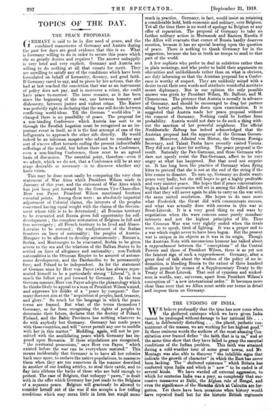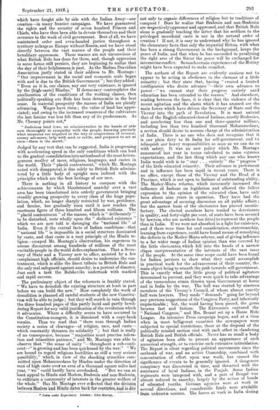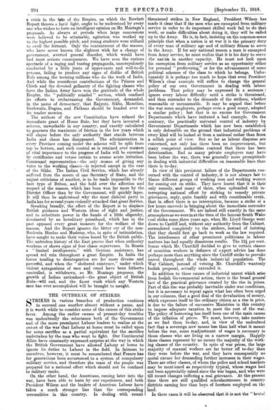THE UNDOING OF INDIA.
WE believe profoundly that the time has now come when the aheltered existence which we have given India cannot be prolonged without damage to her national life . • that, in deliberately disturbing. . . the placid, pathetic con- tentment of the masses, we are working for her highest good." In these ominous words the authors of the most abaazing Con- stitution ever framed define "the faith that is in us," and at the same time show that they have failed to grasp the essential Conditions of the Indian problem. This faith was attained during a cold-weather tour of some great towns, and Mr. Montagu was also able to discover "the infallible signs that indicate the growth of character" in which the East has never been lacking. The " sheltered existence" which Britain has conferred upon India and which is "now " to be ended is of several kinds. We have warded off external aggression, to which for centuries India was a prey, so completely that suc- cessive massacres at Delhi, the Afghan rule of Bengal, and even the significance of the Maratha ditch at Calcutta am for. gotten. Yet there have been occasions when history would have repeated itself but for the historic, British regiments which have fought side by side with the Indian Army—our creation—in ninny frontier campaigns. We have guaranteed the rights and the security of seven hundred Princes and Chiefs, who have thus been able to devote themselves and their revenues to the work of civil government. Best of all, we have maintained order and even-handed justice throughout a territory as large as Europe without Russia, and we have stood directly between the vast masses of the people and. their hereditary oppressors. Those masses are not unconscious of what British Rule has done for them, and, though oppression in some forms still persists, they are beginning to realize that the day of their helplessnesNis past. As the Madras Dravidian Association justly stated in their address to Mr. Montagu : "Our improvement in the social and economic scale began with and is due to the British Government " ; but they added : "Even as it is, our claims, nay our very existence, is ignored by the [high-caste] Hindus." If democracy contemplates the amelioration of the conditions of the working classes, then politically speaking our Rule has been democratic in the best sense. In material prosperity the masses of India are plainly advancing. Wages have risen ; the value of land has appre- ciated; and owing to the increased resources of the cultivators the last famine was less felt than any of its predecessors. As Mr. Chesney points out,*
" Judicious land laws, an administration in the hands of able men thoroughly in sympathy with the people, knowing precisely what measures are required in the way of suspensions of revenue, money advances, help with seed or cattle, and prepared to act at once—there is the secret."
Judged by any test that can be suggested, India is progressing with accelerating speed in the only conditions which can lead to the gradual consolidation into nationhood of the most hetero- geneous medley of races, religions, languages, and castes in the world. Their "placid contentment,' which Mr. Montagu noted with disapproval, is due solely to British Rule adminis- tered by a little body of upright men imbued with the principles which are the best heritage of our race.
There is nothing in all history to compare with the achievements by which bloodstained anarchy over a vast area has been transformed into orderly government bringing steadily growing prosperity to every class of the huge popu- lation, which, no longer sharply restricted by war, pestilence, and famine, has gradually risen until it now reaches the enormous figure of three hundred and fifteen millions. The "placid contentment" of the masses, which is" deliberately" to be disturbed, rests wholly upon the "sheltered existence" which we are now told is damaging the "imtional life" of India. Even if the central facts of Indian conditions—that " national life" is impossible in a social structure dominated by -caste, and that caste is a root principle of the Hindu re- ligion—escaped Mr. Montagu's Observation, his eagerness to arouse discontent among hundreds of millions of the most excitable people in the world defies explanation. That a Secre- tary of State and a Viceroy new to office, assisted by a few complaisant high officials, should desire to undermine the con- tentment, which is alike the finest tribute to British Rule and the only real safeguard against anarchy, is a portent of disaster. Just such a task the Bolsheviks undertook with marked and rapid success.
The preliminary object of the reformers is frankly stated. "We have to demolish the existing structure at least in part before we can build the new." How completely the work of demolition is planned all careful students of the new Constitu- tion will be able to judge ; but they will search in vain through the three hundred pages of this partly lucid and partly bewil- dering Report for any valid justification of the revolution which it advocates. Where a difficulty seems to have occurred to the Constitution-mongers, it is dismissed with a copy-book maxim. Thus we read that "there runs through Indian society a series of cleavages—of religion, race, and caste— which constantly threaten its solidarity " ; but that is really of no consequence, because "majorities must practise tolera- tion and minorities patience," and Mr. Montagu was able to observe that "the sense of unity "—throughout a sub-conti- nent—" is growing and has been quickened by the war." "We are bound to regard religious hostilities as Still a very serioui poss- ibility," which, in view of the shocking atrocities com- niitted Upon Mohammedans by Hindus under the direction Of men of high caste over an area of a thousand square miles last year, " we " could hardly have overlooked. "But we can at least appeal to Hindu and Moslem, Brahmin and non-Brahmin, to cultivate a-community of interests in the greater welfare of the whole." Has Mr. Montagu ever reflected that the division betiveen Moslem -and Hindu dates 'back for eenturieS, and is dai • Indio under Experiment. Loudon: John Murray. not only to organic differences of religion but to traditions of conquest ? Does he realize that Brahmin and non-Brahmin are respectively oppressor and oppressed, and that British Rule alone is gradually teaching the latter that his serfdom to the privileged sacerdotal caste is not in the natural order of creation ? If not, it is easy to understand why he has ignored the elementary facts that only the impartial Briton, with what has been a strong Government in the background, keeps the peace of India, and that when he has succeeded in paralysing the right arm of the Sircar the peace will be exchanged for internecine conflict. So much certain experiences of the Mutiny might have been expected to make manifest.
The authors of the Report are evidently anxious not to appear to be acting in obedience to the clamour of a little minority ; but they state that, having "created a limited inte2ligentsia who desire advance "—their own advance to power—" we cannot stay their progress entirely until education has been extended to the masses." And elsewhere, reading between the lines, it is clear that the violence of the recent agitation and the alarm which it has aroused are the main forces which have driven the Secretary of State and the Viceroy into the path of Revolution. It is most natural that of the English-educated class of Indians, mostly Brahmins, and numbering less than one and three-quarter millions, including less than two hundred thousand Mohammedans, a section should desire to assume charge of the administration of India. There is no one who does not recognize that it is our plain duty to fit India for self-government, and to relinquish our heavy responsibilities as soon as we can do so with safety. It was no new policy which Mr. Montagu announced last year in terms calculated to raise extreme expectations, and the last thing which any one who knows India would wish is to "stay . . . entirely" the " progress " of the little educated minority. Their advance in preferment and in influence has been rapid in recent years. There is no office, except those of the Viceroy and the Head of a Province, which is not open to Indians of outstanding ability. The Morley-Minto reforms, which immensely increased the influence of Indians on legislation and allowed the fullest expression to the opinion of the educated class, have only been about nine years in operation. They have had the great advantage of securing discussion on all public affairs ; but the narrow basis of the electorates has proved unsatis- factory. The elected members have tended to deteriorate in quality, and forty-eight per cent. of seats have been secured by lawyers, who are nowhere less fitted to represent the people than in India. If we were not absorbed in a fight for existence, and if there were time for cool consideration, statesmanship, learning from experience, could have found means of remedying the defects in the Morley-Mints scheme, and of giving influence to a far wider range of Indian opinion than was covered by the little electorates, which fell into the hands of a narrow clique unrepresentative of the interests of the vast mass of the people. At the same time scope could have been found for Indian patriots to show what they could accomplish in practical work for the advancement of their country, the main object being to smooth the path towards self-government. This is exactly what the little group of political agitators determined to prevent, and they were quick to take advantage of the tremendous strain thrown upon Government at home and in India by the war. The ball was started by nineteen members of the Viceroy's Council, of whom almost exactly half were lawyers. They made " demands " going far beyond any previous suggestions of the Congress Party, and inherently impracticable ; 'but, the word having been passed, the game became fast and furious. The Extremists captured the "National Congress," and Mrs. Besant set up a Home. Rule League. An intensive Press campaign began, and at a time when in most belligerent countries the newspapers were subjected to special restrictions, those at the disposal of the politically minded section vied with each other in slandering British Rule and British officials. Never has so small a body of agitators been able to present an appearance of such numerical strength, or to exercise such extensive intimidation. The Report is silent regarding political movements since the outbreak of war, and an active Censorship, combined with concentration of effort upon war work, has caused the significance of events to be generally ignored. A d.angerous conspiracy was discovered in time, and thwarted with the assistance of loyal Indians, in the Punjab. Some Indian regiments were tampered with, and a part of Bengal was almost reduced to anarchy, largely by the action of bands of educated youths. German agencies were at work in several directions,. and considerable funds were available from_unknow-n sources. The forces at work in India during a crisis in the fate of the Empire, on which the Rowlatt Report throws a lurid -light, ought to be understood by every one who wishes to form an intelligent opinion on Mr. Montagu 's proposals. As always at periods when large concessions ,were believed to be attainable, agitation was worked up to the highest possible pitch, and young students were utilized to swell the ferment. Only the contentment of the masses, who have never known the slightest wish for a change of government, averted general disorder, which would have had most serious consequences. We have seen the curious spectacle of a raging and tearing propaganda, unscrupulously conducted by a little junta of upper-caste and well-to-do persons, failing to produce any signs of dislike of British Rule among the teeming millions who do the work of India. And while the munificent contributions of the Princes and Chiefs and the devoted gallantry of the .fighting classes who form the Indian Army have won the gratitude of the whole Empire, the "politically minded" section, which confined its efforts to embarrassing the Government, demanded, in the name of democracy, that Rajputs, Sikhs, Marathas, Garhwalis, Dogras, and Pathans should be handed over to its tender mercies.
The authors of the new Constitution have refused the immediate grant of Home Rule, but they have invented a scheme, unworkable in any country, and exactly calculated to generate the maximum of friction in the few years which will elapse before the only authority that stands between India and chaos has disappeared. The administration in every Province coming under the scheme will be split from top to bottom, and such control as is retained over matters of vital importance to the progress of India will be exercised by certificates and vetoes certain to arouse acute irritation. Communal representation—the only means of _ giving any voice to the working classes—is rejected except in the case of the Sikhs. The Indian Civil Service, which has already suffered from the sneers of one- Secretary of State, and the .unjust criticisms of another' is to, be made impossible to the , best type of Briton, and the hold over the affection and respect of the masses, which has been won far more by the District Officer than by the Government, will quickly. lapse. It will then be understood why the -most disloyal party in India has for several years violently attacked that great Service. Speaking broadly, the -effect of the Report is to displace -British guidance and Western ideas of right and justice, and to substitute power in the hands of a little oligarchy, dominated by an hereditary priesthood, which has in the past opposed every great measure for the welfare of the masses. And the Report ignores the bitter cry of the non- Brahmin Hindus and Moslems, who, in spite of intimidation, have sought to make their voices heard by the British public. The unbroken history of the East proves that when authority weakens or shows signs of fear chaos supervenes. In Russia a " limited intelligentsia," -with German assistance, has spread red ruin throughout a .great Empire. In India the forces tending to disintegration are far more diverse and powerful, and when the " sheltered existence," under which violent antagonisms of race and creed have been hitherto controlled, is withdrawn, as Mr. Montagu proposes, the growth of Indian nationhood—the great object of British Rule—will end, and the finest work which any Western race has ever accomplished will be brought to naught.




































 Previous page
Previous page